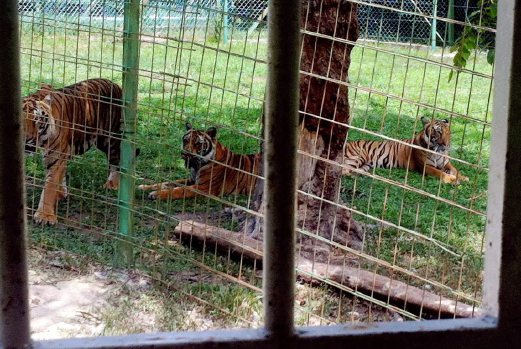ALOR GAJAH: The body of the 38-year-old animal keeper who was mauled by a tiger at a popular resort here on Tuesday has been sent back to his country of origin.
District police chief Superintendent Muhammad Ismail Muhammad Yusof said the body of Herman, who was a Muslim, had undergone ceremonial prayers and proper documentations by a third party before he was sent back to Indonesia on Wednesday.
"In classifying the case as sudden death we have closed the case and the victim, who was single, has been sent back to Indonesia," he said when contacted.
On the fate of the tiger, Ismail said there was no need for it to be put down since each of the eight tigers in the resort were placed in separate enclosures.
"When I visited the tiger on Wednesday and had talks with the veterinarian at the resort and I was made to understand that the adult tiger attacked the victim from the back.
"It could be that the caretaker had taken his relationship with the tiger for granted since he had been handling the tiger for the past eight years, including bathing and feeding it," he said.
It was understood that the adult male tiger was not born at the resort, but purchased overseas by the resort when it was a cub.
The freak incident happened at 2pm on Tuesday when the caretaker was attacked by the tiger during feeding time.
The victim was seriously injured and was rushed to Tampin Hospital where he was later pronounced dead.
Meanwhile, state Society for the Prevention of Cruelty to Animals (SPCA) chairman Vincent Low advised future animal keepers in the resort to do more research about animal behaviour.
"Based on my years of handling animals and encounters with wild animals, they rarely attack humans and they will only attack when they are threatened, cornered or they are really hungry.
"It could be that the caretaker has exceeded the feeding time, or he brought different containers or he came with a different scent, or the tiger was sick and under medication, But it all goes back to proper research on animal handling to prevent incidents like this from happening again.
"Wild animals are also not domesticated and there is a possibility that their hunting instinct might come back even though they are raised by humans," he said when interviewed.
He also advised the state Wildlife and National Parks Department (Perhilitan) to conduct tests on the actual cause of the attack to prevent such cases from recurring.
State Perhilitan director Noorzakiahanum Mohd Noh could not be reached for comment.





